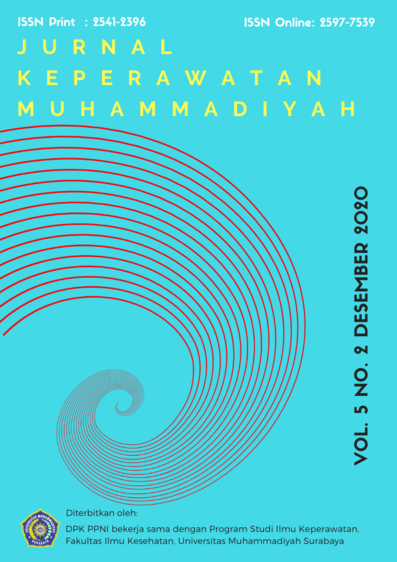Terapi Hipnosis Untuk Mencegah Depresi Post Partum
DOI:
https://doi.org/10.30651/jkm.v5i2.17471Keywords:
Hypnosis, Postpartum DepressionAbstract
Objective: The purpose of this study was to analyze the effect of hypnosis on primiparous tendency postpartum depression
Methods: The study design was a non-randomized group pretest-posttest design. Samples are 24 people primiparous mothers consisting of 12 people who were given hypnotherapy group and 12 people are not given hypnotherapy group. Sampling was done by quota sampling. The research was conducted on two places, namely Puskesmas Tanah Kalikedinding. The instrument used to measure postpartum depression using the Edinburgh Postnatal Depression Scale (EPDS), which has been modified by Soep.
Results: Results obtained chi square test p = 0.015 (<0.005) indicating effect of hypnosis on tendency postpartum depression in mothers
Conclusion: There is an influence of hypnosis on the tendency of postpartum depression in primipara mothers at the Puskesmas tanak Kali Kedinding Surabaya
References
Dewi, N. (2013). Hipnosis pada kehamilan, persalinan, dan periode pasca persalinan dapat mencegah depresi pasca melahirkan. Jurnal Ilmiah Kebidanan, 1(1), 7-12. Foroushani, P. S., Schneider, J., & Assareh, N. (2011). Meta-review of the effectiveness of computerised CBT in treating depression. BMC Psychiatry, 11. https://doi.org/10.1186/1471-244X-11-131
Gunawan. 2007. Hypnosis. Jakarta : Gramedia Hawari, D. 2008. Managemen Stres Cemas dan Depresi. Jakarta : Balai Penerbit FKUI.
Herlina. 2009. Hubungan Tingkat Dukungan Sosial Dengan Tingkat Depresi Pada Ibu Postpartum : Jurnal Ilmu Keperawatan Vol.04/Januari/2009 hal : 24-31
Ibrahim, F., Rahma & Ikhsan, M., 2012.,FaktorFaktor Yang berhubungan dengan Depresi Postpartum di RSIA Pertiwi Makassar tahun 2012 diakses http://repository.unhas.ac.id/bitstream/handle/123456789/4250/Fatma%20Ibrahim%20%28K11108297%29.pdf?seque nce=1
Iskandar S S., 2004.Depresi Pasca kehamilan (postpartum blues) (online) http://ww.mitrakeluarga.net/depresikeh amilan.html
Prevatt, B., Lowder, E. M., & Desmarais, S. L. (2018). Peer-support intervention for postpartum depression : Participant satisfaction and program effectiveness. Midwifery, 64(January), 38–47. https://doi.org/10.1016/j.midw.2018.05.009 Shorey, S., Chee, C. Y. I., Ng, E. D., Lau, Y., Dennis, C. L., & Chan, Y. H. (2019). Evaluation of a technology-based peer-support intervention program for preventing postnatal depression (Part 1): Randomized controlled trial. Journal of Medical Internet Research, 21(8). https://doi.org/10.2196/12410 Stewart, D. E., & Vigod, S. (2016). Postpartum Depression. The New England Journal of Medicine, 375, 2177–2186.Toohey, J. (2012). Depression during pregnancy and postpartum. Clin Obstet Gynecol, 55(3), 788–797. Van der Zee-van den Berg, A. I., Boere-Boonekamp, M. M., Groothuis-Oudshoorn, C. G. M., & Reijneveld, S. A. (2021). Postpartum depression and anxiety: a community-based study on risk factors before, during and after pregnancy. Journal of Affective Disorders, 286(March), 158–165. https://doi.org/10.1016/j.jad.2021.02.062 Wozney, L., Olthuis, J., Lingley-Pottie, P., McGrath, P. J., Chaplin, W., Elgar, F., Cheney, B., Huguet, A., Turner, K., & Kennedy, J. (2017). Strongest FamiliesTM Managing Our Mood (MOM): a randomized controlled trial of a distance intervention for women with postpartum depression. Archives of Women’s Mental Health, 20(4), 525–537. https://doi.org/10.1007/s00737-017-0732-y Yang, S.-T., Yang, S.-Q., Duan, K.-M., Tang, Y.-Z., Ping, A.-Q., Bai, Z.-H., Gao, K., Shen, Y., Chen, M.-H., Yu, R.-L., & Wang, S.-Y. (2022). The development and application of a prediction model for postpartum depression: optimizing risk assessment and prevention in the clinic. Journal of Affective Disorders, 296434–442. https://doi.org/10.1016/j.jad.2021.09.099
Downloads
Published
Issue
Section
License
- Penulis tetap memegang hak atas karyanya dan memberikan hak publikasi pertama kepada jurnal ini yang secara simultan karya tersebut dilisensikan di bawah:Â Creative Commons Attribution-ShareAlike 4.0 International (CC BY-SA 4.0)













